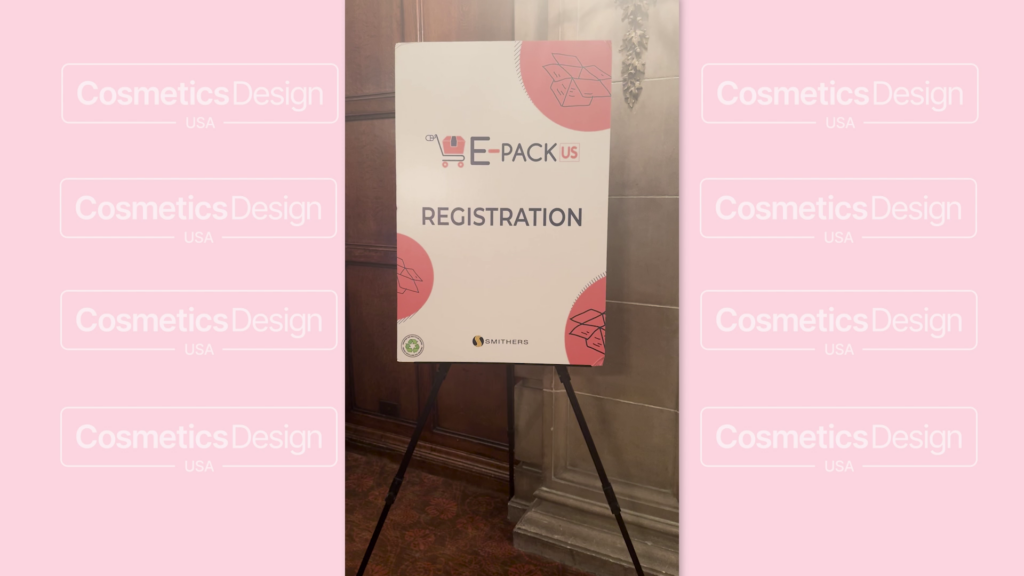[ad_1]
As e-commerce continues to surge, packaging solutions that protect products, meet sustainability goals, and align with evolving regulations are critical—especially for cosmetics and personal care brands that rely on packaging to reinforce brand image and consumer trust. CosmeticsDesign attended this month’s 2024 E-Pack Summit to gain insight into key industry discussions surrounding sustainability, legislation, and innovative partnerships that are essential for navigating today’s packaging challenges.
Here are the top takeaways for cosmetics and personal care brands seeking to thrive in the evolving e-commerce landscape.
Balancing product protection with sustainability
In the summit’s opening session, Thaxton Lipscom delivered a talk titled “Cracking the Code to Sustainable Packaging in E-Commerce.” With e-commerce driving up packaging waste, the pressure is on for brands to find sustainable solutions that still protect products.
Lipscom emphasized the importance of balancing durability and eco-friendliness, as well as the need for reverse logistics strategies that enable seamless returns and recycling.
For cosmetics and personal care brands, this could mean exploring options like refillable or recyclable packaging that can cater to environmentally conscious consumers. Implementing these strategies not only enhances a brand’s sustainability profile but also offers a competitive edge.
Many brands, for example, are experimenting with refillable systems that allow consumers to easily return empty containers, reducing overall waste and strengthening customer loyalty.
Navigating new packaging legislation
Rob Keith, Membership and Policy Director from AMERIPEN, discussed the growing impact of legislation on e-commerce packaging. With Extended Producer Responsibility (EPR) laws, Recycled Content Mandates, and labeling restrictions becoming more prevalent across the U.S., packaging design and recycling practices will need to adapt accordingly.
These regulations will greatly influence materials selection and recycling claims.
For cosmetics manufacturers, staying proactive on these regulations is crucial. Keith encouraged industry leaders to engage with policymakers to help shape future packaging guidelines.
Cosmetics brands may benefit from joining groups like AMERIPEN or attending industry forums to stay informed and contribute to policy discussions that affect their businesses.
Preparing for EPR and labeling laws
Joe Dages, an attorney from Steptoe & Johnson LLP, led a session on “Extended Producer Responsibility (EPR) for Packaging and State Laws.” Using California’s SB 343 as a case study, Dages highlighted how this landmark 2021 law has set new, stringent standards for recyclable claims, impacting brands’ labeling practices.
SB 343’s regulations, which limit the use of “recyclable” claims unless strict criteria are met, are expected to serve as a model for other states considering similar measures.
For cosmetics and personal care brands, compliance with SB 343—and other evolving state requirements—is essential. Brands selling products in California, or in states that may adopt similar laws, should perform regular regulatory audits to ensure that recyclability claims meet the latest standards.
Partnering with legal experts to assess current packaging can help companies avoid compliance risks and proactively design packaging that aligns with new legislation.
Building partnerships for reliable fulfillment
Maggie Barnett, COO of ShipHero, discussed in a fireside chat titled “Innovation in E-Commerce: Power of Partnerships” how critical fulfillment logistics are to brand success in beauty and personal care. With 85% of online shoppers reportedly avoiding reordering after a bad delivery experience, the stakes for effective e-commerce logistics are high.
Barnett shared examples from brands like Apres Nails and Dr. Barbara Sturm to illustrate how strategic partnerships can help companies scale while maintaining the transparency and reliability that consumers expect.
For beauty brands, investing in fulfillment partnerships not only enhances consumer satisfaction but also builds a solid logistics foundation that can sustain growth. For example, brands can seek logistics partners with advanced tracking systems, allowing customers to follow their orders in real-time, which has been shown to improve brand loyalty.
Securing authenticity and trust in the supply chain
Dave Sandello, U.S. VP of Securikett, led a session on protecting brands’ packaging from counterfeiting and tampering. High-value cosmetics and personal care products face increased risks in the e-commerce channel, and Sandello emphasized the importance of integrating simple yet effective security measures to safeguard against these risks and ensure authenticity.
For brands, adopting security features such as tamper-evident seals or unique tracking codes on packaging can prevent counterfeiting and reassure consumers that products are genuine. This is especially important as the e-commerce sector grows and the risks of counterfeit goods increase.
By investing in secure packaging and tracking systems, brands can protect their reputation and reinforce consumer trust.
Staying adaptable in an evolving landscape
Throughout the E-Pack 2024 Summit, discussions emphasized that the future of packaging for cosmetics and personal care brands lies at the intersection of sustainability, legislation, and innovative partnerships. From understanding new packaging regulations to implementing secure and transparent fulfillment, cosmetics brands are encouraged to remain adaptable to these rapidly changing demands.
By staying informed and proactive, brands can not only navigate today’s packaging challenges but also build lasting consumer trust in an eco-conscious marketplace.
[ad_2]
Source link

